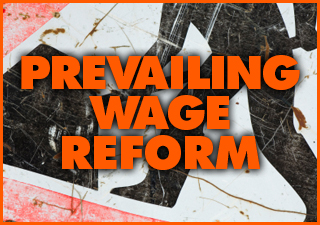Media

Budget Opens Door for Prevailing Wage Reform
Before taxpayers are asked to give more for Pennsylvania’s transportation needs, are current transportation tax dollars being spent wisely? That’s the question several lawmakers are asking, as time winds down on the Governor’s budget priorities, of which transportation is one.
Earlier this month the state Senate approved a bill that would fund a $2.5 billion increase in Pennsylvania’s transportation funding, but the bill could be in trouble after conservative House lawmakers stated they would not support the plan without prevailing wage reform.
The half-century-old prevailing wage law adds zero value to the taxpayers but costs us a bundle—upwards of $900 per year for the typical family of four. The law requires that a community’s “prevailing wage” (a union-inflated amount) be paid on public construction projects above $25,000. The $25,000 threshold has not been adjusted since its early 1960s level, when the average home cost half that amount. Previaling wage doesn’t just hit taxpayers, it stretches the budgets of townships, counties, boroughs, cities and school districts.
Tuesday, Reps. Marsico, Millard, and Bloom discussed the prevailing wage reforms they are seeking via a Google Hangout broadcast. Their reforms include excluding road maintenance from prevailing wage, raising the $25,000 project threshold to $100,000, and allowing local governments the ability to opt-out of prevailing wage laws.
Before any transportation taxes are increased, we should demonstrate that the billions we already spend on transportation are maximized. Prevailing wage reform is one way to ensure taxpayers are getting the most bang for their buck.
For more on the budget prevailing wage discussion, watch the entire Google Hangout here. For more background on Pennsylvania’s prevailing wage law and its impact on school districts, local governments, and taxpayers, click here.